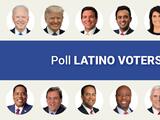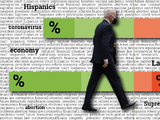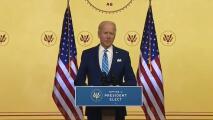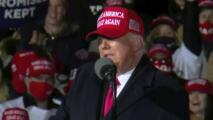Virginia election provides Democrats with recipe for Latino vote in 2018

The strong showing on Tuesday by Democrats owed much to a new "go local" grass roots strategy that targeted state and municipal elections with progressive candidates, according to Latino activists who hope to replicate that success nationwide in 2018.
While many political pundits saw Tuesday's results as a referendum on President Donald Trump, activists who worked on the campaign say equally important was the on the ground field work as well as candidate recruitment, pointing to record Latino turnout as evidence.
"There was a lot of investment in other areas like canvassing and ground game that in the past were left to the state parties," said Jorge Silva, vice-president of communications at the Latino Victory Fund, the campaign arm of the Latino Victory project founded by actress Eva Longoria to build Latino political power.
Democrats won the governor’s mansions in Virginia and New Jersey. They also flipped a massive number of seats in the Virginia House of Delegates. Voters also elected a slew of women and minorities along with several transgender candidates to government offices around the nation, including Elizabeth Guzman and Hala Ayala, who were both elected to the Virginia Assembly.
The leading role played by minority voters and candidates on Tuesday highlights a major debate in the Democratic Party about future electoral strategy to beat back Republican strength among white voters.
Higher voter turn out and the success of minority candidates validates the view of many Democrats who argue the party shouldn’t stray away from racial identity politics, which some critics see as one of the reasons voters rejected the party in November 2016.
On the Republican side, party officials blamed Tuesday's losses to a normal pattern of incumbents doing poorly in 'off-year' elections. But some also blamed the party's failure to reach out to minorities. "Many times the Republican Party does not make itself understood with the minority communities where many are receptive to their message of God and freedom," said Lolita Mancheno-Smoak, a Latina Republican who lost her bid for a seat at the State Assembly in Virginia.
Latinos, who make up 5% of eligible voters in Virginia, turned out in record numbers, representing 6% of actual voters, according to exit polls. Ralph Northam, the Democrat who beat Republican Ed Gillespie in Virginia's gobernatorial election, was backed by almost 7 out of 10 Latinos.
Blacks and Asian Americans also voted in higher numbers.
Turnout and 'Trump effect'
Turnout by Latinos for early voting registered a 114% percent leap in early and absentee voting over the last state elections in 2013, according to a Voter Participation Center study released the day before the election.
Participation on election day increased 5% at precincts in heavily Hispanic districts, from 33% to 38%. The highest turnout increase occurred in precincts where progressive Latinos were on the ballot.
The race in Virginia was tinged by the divisive topics of race and immigration, as Gillespie followed Trump’s playbook, with racially-infused attacks on Northam for supposedly being weak on crime by Latin gangs.
Democrats hit back with an ad by Latino Victory Project featuring a sleeping immigrant child having a nightmare about being chased by a Gillespie supporter in a truck with a Confederate flag.
A poll by Latino Decisions on election eve showed the ads had a significant effect on Latino voters. Latinos who saw it voted 82%-15% for Northam. Those who didn’t sided 57%-40% for Northam.
"They used the Gillespie ad against him. It pissed people off,” said Latino Decisions co-founder Matt Barreto.
Gillespie was also attacked by Latino groups for his tepid condemnation of a white supremacist march in Charlottesville, Virginia, in August and for his support of confederate monuments.
Activists say rather than using traditional party political messaging that typically targets existing reliable voters in the hope of flipping Trump supporters, they went after new, younger "low propensity" voters with a progressive message designed to appeal to minorities.
Progressive candidates
As part of that strategy, they also went out and recruited promising minority candidates in local races.
After the disappointment of the 2016 general election, "we decided to go deep into state elections," said Silva, creating new chapters in several states. "We are hoping to plant seeds all over the country ... candidates with name recognition who can be ready for prime time."
He likened it to the World Series baseball champs, the Houston Astros, who famously built a farm system with young unknown talent who emerged as Major League stars this year. "We need to develop a bench for state office," he said.
The effort in Virginia was strengthened by several get-out-the-vote groups such as Voto Latino and CASA in Action who invested major resources to educate voters and train new Latino leaders.

"We saw Virginia as a strategic opportunity to send a message to this administration of hate," said CASA in Action director, Gustavo Torres, a Colombian-born former journalist.
CASA in Action raised $1 million - mostly from NextGen, a political fund created by California billionaire Tom Steyer - and focused its efforts on two counties -Prince William and Fairfax- with high numbers of Latinos with historically low turn out.
"That gave us the resources to mobilize," said Torres, saying the group hired a team of 60 campaign workers. " We were the foot soldiers," he said.
Well known in the Latino community, CASA in Action was created seven years ago as an offshoot of CASA, which has worked with Central American immigrants for decades. Its team knocked on almost 59,000 doors and mailed 54,000 eligible Latino voters.
The group also invested $170,000 in Spanish-language television and radio ads. "We were in permanent conversation with the Latino community. That had never happened before," added Torres.
CASA in Action also worked closely with the Democratic Party, aided by the fact that the current Democratic National Committee (DNC) head, Tom Perez, is a former president of CASA's board, and was a county council member in Maryland.
Democrats and diversity
However, activists say the party has yet to embrace minorities - despite the arrival of Perez - and is still heavily focused on mainstream white voters.
"How do we get the Trump voter back. That's not a winning strategy for us at all," said Jessica Reeves, 33, chief operating officer with Voto Latino, which is a non-partisan group that focuses on voter education and leadership training.
"We seek to really invest locally and build empowerment from the ground up ... if you engage Latinos they will turn out and participate," she said.
Reeves and others argue that younger, digitally-savvy post-Millenial 'Generation Z' Latinos represent a massive untapped voting block. "It's the largest generation we have ever seen, and the most diverse," Reeves said.
Voto Latino has also created 24 local and city chapters to invest in "training young people to carry this torch," she said.
For its part the DNC said it had sought to correct "mistakes of the past" and invested $1.5 million in last week's elections, including a "new boots-on-the-ground strategy,"
In a prss release it said "100% of the money the DNC invested was used toward organizing and mobilizing voters, and data and technology; none was used on TV."
"Going local"
It created a campaign "When they go low we go local," (#VlGoingLocal) and trained almost 100 people at a popup Power Summit in Annandale, a heavily Hispanic city in Fairfax County to engage the local community and identify leaders. "It's a model that we started testing in 2016 and really doubled down on in 2017," said Reeves.
She said its text messaging network has grown 25% in the last year to almost one million followers.
Reeves says last week's turnout was more about demographics than party political campaigns, noting that there were few groups on the ground. "There was no big push. What the numbers show is purely demographics," she said.
And there's another lesson in that, she stressed. "There's an opportunity to do a lot more. There's a huge opportunity and a huge hunger. We have to harness that energy and passion," she said.
Only 44% of Latino voters surveyed by Latino Decisions on election eve said they had been contacted by a campaign or community organization, the lowest number of any ethnic group.
2018 and beyond
The grass roots activists are now looking forward to 2018.
If Latino participation grows in the next congressional elections at the same rate as in Virginia, the Democratic Party could receive a big boost in its efforts to regain control of the House of Representatives. In the 2014 mid-term elections, only 27% of Latinos participated.
Voto Latino says it will be working closely with its new chapters in Arizona, Colorado, Nevada, Texas and California, as well as contributing to efforts in Florida and North Carolina.
CASA in Action plans to focus on educating voters in Pennsylvania, Maryland and Virginia in the midterms.
Latino Victory Project is looking to deepen its state chapter strategy and is looking at seats in California, Texas and Arizona. "We are actively recruiting Latinos," said Silva, pointing to recent success at state level such as Nelson Araujo, a councilman in Nevada who is running for Secretary of State in 2018, and Crisanta Duran, who became the first Latina speaker of the House of Representatives in Colorado this year.
In Texas, Democrats have high hopes for Veronica Escobar who is running for a congressional seat in El Paso being vacated by Beto O'Rourke who is challenging Ted Cruz for his Senate seat.
Another prospect is Texas Latino Austin city council member Greg Casar.
But Silva recognizes that, like the Houston Astros, it may realistically take time to get candidates ready for the major leagues.
"We are talking about the long run; 2020 and 2022," he said.
Janet Rodríguez contributed reporting from Virginia



